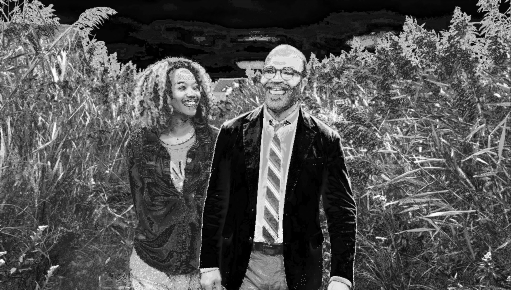
In Cord Jefferson cinematic adaptation of Percival Everett’s Erasure, American Fiction emerges as a hard-hitting commentary on identity, storytelling, and the microaggressive terrains of the publishing industry. With a powerhouse ensemble, led by Jeffrey Wright and supported by the likes of Tracee Ellis Ross and Sterling K. Brown, the film aims to deconstruct the publishing world as it relates to myriad facets of Black lives.
American Fiction starts with Thelonius “Monk” Ellison (Ellison) in class with students who are disconnected from what he’s teaching as he argues with a student over the use of the N word. This is a problem for the school faculty and he’s forced to take a vacation. Monk runs to his publisher to find his latest book is having trouble finding a publisher. These companies claim they want books about the raw Black experience, but these types of books often reduce Black people to stereotypes. With that, he travels back to his hometown of Boston to attend a book festival, but the turnout is low in favor of another book seminar with author Sintara Golden’s book We Lives In Da Ghetto. Her novel is extremely popular, and he starts noticing that he may have to take a different approach to writing. Unfortunately, he isn’t willing to accept this is the new reality.
Related Stories

Ladj Ly Talks Housing Crisis Drama 'Les Indésirables'; Police Violence & Plans For A Next Project In Africa – Toronto

"We Have A Complex Relationship With Our Abusers": Filipino Filmmaker Jun Robles Lana Talks Toronto Title 'Your Mother's Son'
In Boston, meets up with his sister Lisa (Ellis-Ross) who works at Planned Parenthood and is going through a messy divorce. They visit their mother who is losing her memory to Alzheimer’s and they aren’t sure what to do about it. Sitting around at lunch one day, Lisa has a heart attack. This brings their estranged brother Cliff (Brown) who is a pill popping, alcoholic, plastic surgeon whose life has also fallen a part due to a divorce, so now he’s back in the family fold. Monk spends most of his day the family beach house thinking about Sintara Golden. One day, he has a stroke of genius and begins to write the novel, My Pafology, a hood story that features all that Blackness has to offer: single mothers, police brutality, smoking crack, and gang shootouts.
One of the film’s boldest claims is its critique of the publishing world. Known for its fleeting interest, the industry often cannibalizes what’s trending, sometimes at the loss of quality and authenticity. This mechanism is painfully evident in the portrayal of Black trauma – a raw and tender narrative that the media seems drawn to. While Black stories are in demand, there’s a lurking resistance to seeing Black individuals truly flourish. When the industry does embrace these narratives, it often exerts its voice, overshadowing real tales and their tellers. Jeffrey Wright’s Monk becomes the symbol of this struggle, a character wrestling with both external pressures, personal demons, and the desperation for money.
This brings us to one of the film’s few criticisms. At times, American Fiction feels like it’s straddling two different stories. The dealings with his parody book play second fiddle to the compelling family drama, causing a narrative imbalance. As separate storylines they work, but together, not so much. However, there is a point to the dual narratives to show that Black individuals are not a monolithic entity. The family dynamics, juxtaposed against Monk’s publishing quagmire, speak volumes about the layers and nuances that define Black experiences.
In Hollywood, Jeffrey Wright has effortlessly held his title as one of Tinseltown’s most reliable leading men. Throughout his career, he’s masterfully stepped into the shoes of a diverse array of characters from all corners of life. The ensemble cast, featuring luminaries like Tracee Ellis Ross, John Ortiz, and Sterling K. Brown, among others, adds depth and nuance to the narrative. Each character is a testament to the tapestry of Black life and provides a reflection to the multi-dimensional realities Black individuals navigate. These performances are the one thing keeping this plot from falling apart.
But perhaps the most impactful message American Fiction delivers is about personal agency in a world that often seeks to define the stories of others. The media’s myopic view of Black lives might never shift, but individuals have the power to set their own narratives and boundaries. This film challenges viewers to reflect, question, and possibly reevaluate their perceptions on Blackness.
American Fiction is universal in its emotional approach. It will draw various reactions – from laughter to discomfort. Some scenes, especially one towards the end involving the police, might divide audiences. While some found humor, others, including me, found it deeply unsettling, and even more so since people were laughing. Driving home the point that the portrayal of Black lives in media stagnant nor straightforward.
Title: American Fiction
Festival: Toronto Film Festival
Distributor: Orion Pictures/T-Street
Release date: September 29, 2023
Director: Cord Jefferson
Screenwriters: Cord Jefferson
Cast: Jeffrey Wright, Tracee Ellis Ross, John Ortiz, Erika Alexander, Leslie Uggams, Adam Brody, Keith David, Issa Rae, and Sterling K. Brown.
Rating: R
Running time: 1 hr 57 min
Must Read Stories
WGA Says Several Companies Have “Desire” To Make Deal; AMPTP Calls Claim False
Quentin Tarantino’s Final Movie Snags Big California Tax Credits, Will Shoot In L.A.
‘Conjuring’ Universe Sequel Collects $3.1M In Thursday Previews
Capitol Hill Pols On Labor Dispute & Destructiveness Of A Pyrrhic Victory
Read More About:
Source: Read Full Article




